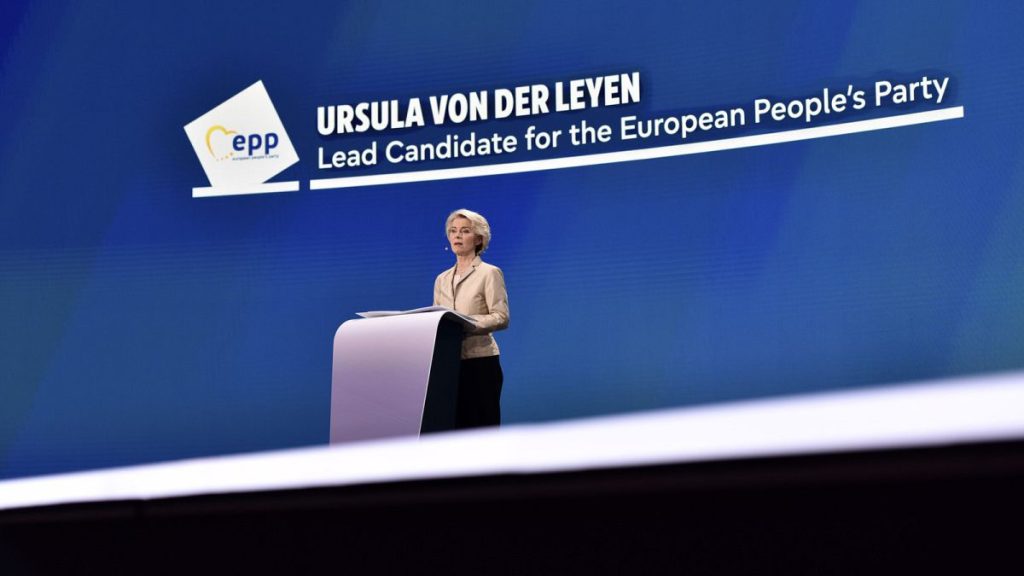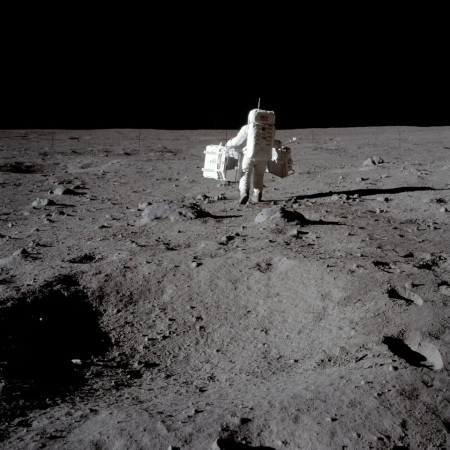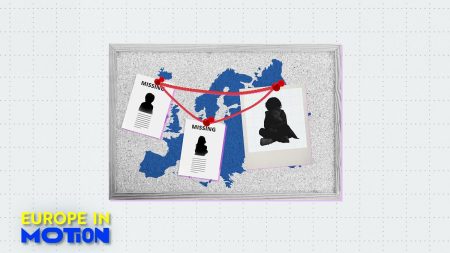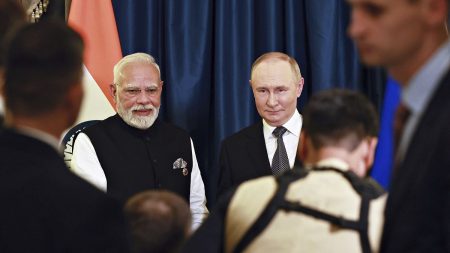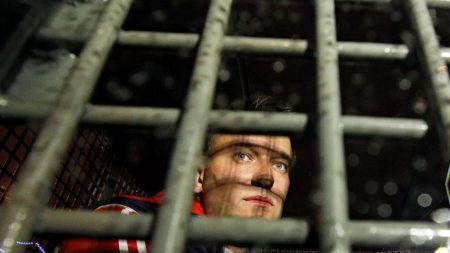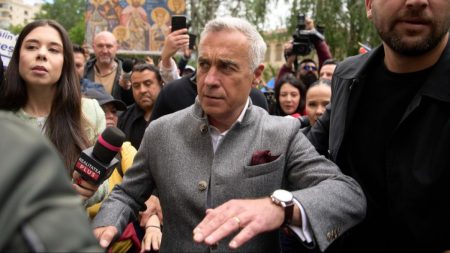Summarize this content to 2000 words in 6 paragraphs in Arabic
The pro-European parties at the centre command a majority, despite voters veering to the right. But Ursula von der Leyen’s path to re-election is fraught with difficulties.
ADVERTISEMENTAround 185 million voters across 27 EU countries have had their say, and right-wing parties have seen support creep up in all corners of the continent, tilting the balance of power in the European Parliament.But the projected surge in support for far-right parties was not as pronounced as some had expected, meaning that if there is sufficient political will, the pro-European coalition at the centre will hold.Although more strained than ever before, the so-called ‘grand coalition’ between the centre-right European People’s Party (EPP), the centre-left Socialists and Democrats (S&D) and the liberal Renew Europe group secured 403 lawmakers – around 56% of all seats – between them, according to Monday morning’s estimates.These parties have for years cooperated at the EU level, building a firewall to prevent the radical right from entering the political mainstream. While their majority is now narrower, these groups could continue to work together to ensure the EU legislative machine operates smoothly during the upcoming tenth mandate.All eyes will now be on the election winners, the EPP, which scored a clear victory and consolidated its dominance in the new chamber. Its lead candidate Ursula von der Leyen has previously indicated her readiness to work with certain parties sitting with the hard-right European Conservatives and Reformists (ECR).But the initial signals coming from the EPP camp, however, suggest they will stay true to their traditional allies at the centre. European President Roberta Metsola told Euronews: “From the first projections it looks like the constructive, pro-European centre has held.”Von der Leyen also offered to work with socialists and liberals to build a “majority in the centre for a strong Europe,” carefully calibrating her words to appease critics who have slammed her recent overtures to the hard right.”In other words, the centre is holding,” von der Leyen added. “But it is also true that the extremes on the left and the right have gained support and this is why the result comes with great responsibility for parties in the centre.”However, since the European Parliament works not through a stable coalition but rather issue-by-issue coalitions that form according to the legislative bill at hand – and since groups do not always vote in a bloc with rebellions common – it could mean narrow voting margins especially for sensitive files such as those related to the European Green Deal.The limited room for manoeuvre could see the EPP rely on partners to its right on an ad-hoc basis – including for the new hemicycle’s first decision to usher in a new Commission president.Von der Leyen’s future hangs in balanceAfter her EPP party romped to victory, increasing its seat share by eight, Ursula von der Leyen is set to have a first shot at securing five more years at the helm of the European Commission, in accordance with the so-called Spitzenkandidaten process.But her re-election chances have been complicated not only by the arithmetic of the new parliament, but also by President Emmanuel Macron’s decision to call for snap legislative elections in France.Some say a weakened Macron and an embattled Chancellor Scholz – whose German socialist party finished third, trailing the main opposition CDU/CSU party and the far-right Alternative for Germany (AfD) – could derail her nomination. EU leaders are due to gather in Brussels to formally nominate a candidate for the top Commission job on June 28, just days before voters head to the polls in France. With von der Leyen deeply unpopular in France – even the French EPP delegation opposes her re-election – nominating her days before the ballot could dent Macron’s popularity further.If she does pass that hurdle and is nominated by EU leaders, she will then need to secure the backing of an absolute majority of 361 newly-elected Members of the European Parliament (MEPs) in a secret ballot.That vote was initially scheduled for mid-September but, according to media reports, could happen as soon as 18 July during the inaugural sitting of the new parliament in Strasbourg.In 2019, von der Leyen passed that test by a razor-thin margin of nine votes.ADVERTISEMENTThis time, national delegations within her EPP grouping could oppose her re-election. And if the socialists and liberals rally their members to vote for her, there are ample possibilities for small national coalitions to rebel.These narrow margins mean von der Leyen may rely on the support of the lawmakers of Giorgia Meloni’s Brothers of Italy (FdI) party, which clinched an impressive 24 seats according to preliminary results. It firmly cements Giorgia Meloni’s position as a power broker on the EU stage.But by relying on Meloni, von der Leyen risks estranging left-leaning allies, and is unlikely to get the backing of the Greens, who also voted against her back in 2019 and who suffered some of the biggest losses on Sunday night, losing 20 seats and seeing its power in the hemicycle eroded.Re-shuffling could benefit right wingThe arithmetic of the European Parliament can also shift once newcomers or parties that are currently politically homeless in the European Parliament negotiate group affiliation. Talks on party affiliations are expected to kick off Monday.ADVERTISEMENTWith many of these parties belonging to the far-right, it does mean that a potential reshuffle could bolster the numbers of the two far-right groupings, Identity and Democracy (ID) and the European Conservatives and Reformists (ECR).Parties currently categorised as non-attached include Viktor Orbán’s Fidesz, estimated to have secured 10 seats, which could look to join the ECR and further boost the nationalist grouping’s numbers.Marine Le Pen – whose French National Rally was the big winner of the night, clinching more than 31% of the vote and prompting President Emmanuel Macron to call snap legislative elections – has also indicated her appetite to form a hard-right super grouping including Giorgia Meloni’s FdI lawmakers.It has cast Meloni as a kingmaker, as she’s also courted by von der Leyen on the centre-right. Meloni is likely to play her cards carefully, as cosying up to Le Pen could ruin her opportunities to collaborate on an ad-hoc basis and thereby have a definitive stake in shaping EU policy.Parties currently without a political family also include the embattled AfD of Germany, which despite a recent raft of scandals involving probes into foreign influence and neo-Nazi ties, came in second in Germany with 16 seats in the European Parliament.ADVERTISEMENTExpelled from the hardline Identity and Democracy (ID) group at the end of May, it is unclear whether AfD can join forces with other radical parties to form a fringe group at the very extreme right of the parliament. To do so it needs at least 23 lawmakers from at least seven EU member states.The reshuffling of the groups could also further dent the numbers of the centrist Renew Europe group, which suffered massive losses, dropping 22 seats according to estimates.Their president Valérie Hayer has already indicated that the Dutch People’s Party for Freedom and Democracy (VVD) will be expelled as early as Monday for agreeing to enter government with Geert Wilders’ far-right Party for Freedom (PVV) in the Netherlands. The Dutch deal was struck just days after the Renew Europe group publicly vowed to never enter government with far-right parties “at any level.”It could see Renew’s seat numbers drop to 76, putting added pressure on the centrist coalition and further stressing the numbers von der Leyen needs to confirm her re-election.ADVERTISEMENT
رائح الآن
rewrite this title in Arabic Europe veers right but centre-ground resists: What the EU election results mean and what’s next
مقالات ذات صلة
مال واعمال
مواضيع رائجة
النشرة البريدية
اشترك للحصول على اخر الأخبار لحظة بلحظة الى بريدك الإلكتروني.
© 2026 جلوب تايم لاين. جميع الحقوق محفوظة.






